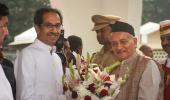'This will require statesmanship and not politicking.'

"The powers vested in the governor can be given to other democratic institutions and nothing will be lost, but a major irritant will be done away with the abolishing of the post," argues former Union home secretary Dr Madhav Godbole.
Dr Godbole's latest book India - A Federal Union of States - Fault Lines, Challenges and Opportunities (Konark Publishers) analyses sensitive issues confronting India and provides solutions. It is the latest in a series of 26 books he has written on Indian policy issues since he left government in 1993.
"It (governorship) is a totally anachronistic institution in a democratic setup," Dr Godbole tells Rediff.com's Archana Masih in the third part of an extensive interview.
- Part I: 'Hindu Rashtra will not keep India together'
- Part II: 'Hindu rashtra can't consist of Hindus alone'
Your book takes a hard look at the problems of Centre-state relations. What are some of the major irritants and what could be the solutions to those problems?
There are three major irritants in Centre-state relations.
1. Post of governor:
The Constitution relied on the Government of India Act of 1935. The governing structure of India is the same as it was in the 1935 Act and during the British period.
Therefore, the institution of governor has been copied from that and has continued all these years. It is a totally anachronistic institution. Its main purpose was to enable the Centre to have its own person to keep a constant watch over the state.
The manner in which the governors have conducted themselves, irrespective of which political party was in power, has shown them as representatives of the central government and not the President of India.
The guidelines, which were laid down by several commissions of inquiry, have not been followed by the Government of India in making the appointments of governance -- even the Supreme Court judgment of 1978-1979 has not been followed by the Government of India and therefore, over 70 years, the political system has functioned in a particular way. It only means that this office is not workable in a democratic setup.
Therefore, I have argued that the institution of governor should be abolished. I have mentioned Article by Article (of the Constitution) how the powers vested in the governor can be given to other democratic institutions and nothing will be lost, but a major irritant will be done away with the abolishing of the post.
2. Article 356 pertaining to Presidents Rule.
The S R Bommai vs Union of India judgement of 1994 put an end to the arbitrary dismissal of state governments and the Supreme Court supervises the proper application of Article 356. This has drastically reduced the misuse of this article.
Therefore, it should remain as an emergency provision. But I have other worries about Article 356. There have been two occasions in particular where it wasn't applied when it should have -- before the demolition of the Babri Masjid in UP and after the Godhra riots in Gujarat.
In the former case, it was the Congress party which was in power at the Centre and in the latter, it was the BJP. Hence, both national parties have conducted themselves the same way.
Those who are likely to govern India in the foreseeable future have shown that they are incapable of handling this issue for purposes of safeguarding their own parties.
3. The division of responsibilities between the Centre and states. The three lists -- the Central, State and Concurrent -- were basically drawn from the 1935 Government of India Act. Its aim was to have a strong Centre when the Constitution was framed. But the situation has changed over 70 years.
Therefore, we ought to look at this more rationally in terms of what is necessary and what is not. At the same time, political rhetoric about this should be done away with.
Only subjects that seriously pertain to the national interest and need to be looked as a whole should be in the concurrent and central list -- all other subjects should be in the state list.
This will require statesmanship and not politicking. It will require a dialogue on a different level.
Feature Presentation: Aslam Hunani/Rediff.com











 © 2025
© 2025